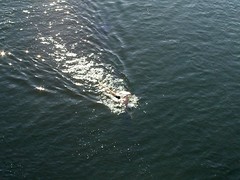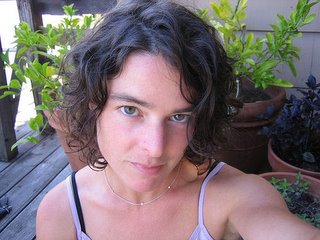in the bird sanctuary and endurance capital of the world
On Saturday afternoon, I pulled into the Overlook parking lot, the sanctioned unofficial campgrounds for the Auburn triathlon. A few patches of grass ringed the newly paved parking lot; clusters of teenagers huddled around the few cars, the thwacking of skateboards against concrete mingled with birds. Just beyond the parking lot, green grass gave way to dried brush, and abruptly the foreground disappeared, abutting against a distant backdrop of mountainous green forests. I parked, wandered up to the edge of the overlook, but all I could see below was bushes and a concrete skate ramp.
I'd arrived early so that I could go for a ride, so I left the car with the smokers and skaters, and headed out for what I hoped would be some spectacular riding. I rode about Auburn, saw many for sale signs, lots of grandly built mansions, and tons upon tons of cars. This was looking less and less like the small country town with rolling backroads that I'd imagined. Then I came across a father seated on a curb, his small child leaning between his legs, the two of them watching a parade of antique cars leaving the car show, and Auburn shifted back, slightly, towards the small towns I remember from Virginia.
When I got back to Overlook, different groups of teenagers had arrived, in small groups they headed down dusty paths, with their cold bevs and cigarettes. A few more pick up trucks joined the sparse cars; a couple of dogs added their relentless barking to the thunking skateboards. I spread a blanket on the ground and watched the world pass by--in the form of an elder gentleman who had carefully unpacked his walker from the trunk of his american car. He was dressed like my grandfather, in a short-sleeved button down, polyester slacks and probably from the same era. He took one loop of the parking lot, and on the second loop, I asked him how many laps he was going to do.
Four, he said. I figure it's about a mile, maybe more.
I nodded. What do I know, about the distance of a parking lot. And I thought about what it means to get old and require a walker, to be amidst all this spectacular beauty but prevented from taking the dusty trail, with all the teenagers, down to the overlook.
What a beautiful area, I said. And gestured vaguely to the mountains and the gorge behind us.
It's too crowded now, he complained. This used to be a nice place. When I moved here in 1946 (forty-six! I exclaimed), it was a nice town. Now it's too crowded. All those people moved up here... and he named a bunch of cities where many of Mychal's co-workers live... and they work down in Sacramento. I nodded, but didn't correct him--they work further away than that, even. They just want their kids to go to the nice schools. Again I nodded, it's true; and wondered, how this crazy experiment of America is supposed to work if we all believe that our town really is our town, and not "theirs."
The next day after the race, as I loaded my car, I saw the gentleman again. He was similarly dressed, walking his laps of the parking lot. I hailed him, and he continued where he had left off yesterday.
It used to be so nice here. All those people move up from the city, bringing their drugs. He made a fist and pointed to his knuckles--with their tatoos, he said. They were good country kids, he said, and now they've brought drugs and all that stuff.
Of course, he meant two different "they"s, his gesture made that clear, but the fact that he used the same word brings the problem to light: "they" is so impossible to define, especially when "they" begin to become "us," or vice versa, and that gesture of blame, so temptingly close, becomes all the more futile and distant.
At the edge of the parking lot, the background and the foreground merge, the unseen chasm, so deep in the gorge, doesn't provide the visual barrier necessary to keep them apart. But if you've lived there since 1946, you don't need to take the dirt path down to find the gorge. You know it's there.
I'd arrived early so that I could go for a ride, so I left the car with the smokers and skaters, and headed out for what I hoped would be some spectacular riding. I rode about Auburn, saw many for sale signs, lots of grandly built mansions, and tons upon tons of cars. This was looking less and less like the small country town with rolling backroads that I'd imagined. Then I came across a father seated on a curb, his small child leaning between his legs, the two of them watching a parade of antique cars leaving the car show, and Auburn shifted back, slightly, towards the small towns I remember from Virginia.
When I got back to Overlook, different groups of teenagers had arrived, in small groups they headed down dusty paths, with their cold bevs and cigarettes. A few more pick up trucks joined the sparse cars; a couple of dogs added their relentless barking to the thunking skateboards. I spread a blanket on the ground and watched the world pass by--in the form of an elder gentleman who had carefully unpacked his walker from the trunk of his american car. He was dressed like my grandfather, in a short-sleeved button down, polyester slacks and probably from the same era. He took one loop of the parking lot, and on the second loop, I asked him how many laps he was going to do.
Four, he said. I figure it's about a mile, maybe more.
I nodded. What do I know, about the distance of a parking lot. And I thought about what it means to get old and require a walker, to be amidst all this spectacular beauty but prevented from taking the dusty trail, with all the teenagers, down to the overlook.
What a beautiful area, I said. And gestured vaguely to the mountains and the gorge behind us.
It's too crowded now, he complained. This used to be a nice place. When I moved here in 1946 (forty-six! I exclaimed), it was a nice town. Now it's too crowded. All those people moved up here... and he named a bunch of cities where many of Mychal's co-workers live... and they work down in Sacramento. I nodded, but didn't correct him--they work further away than that, even. They just want their kids to go to the nice schools. Again I nodded, it's true; and wondered, how this crazy experiment of America is supposed to work if we all believe that our town really is our town, and not "theirs."
The next day after the race, as I loaded my car, I saw the gentleman again. He was similarly dressed, walking his laps of the parking lot. I hailed him, and he continued where he had left off yesterday.
It used to be so nice here. All those people move up from the city, bringing their drugs. He made a fist and pointed to his knuckles--with their tatoos, he said. They were good country kids, he said, and now they've brought drugs and all that stuff.
Of course, he meant two different "they"s, his gesture made that clear, but the fact that he used the same word brings the problem to light: "they" is so impossible to define, especially when "they" begin to become "us," or vice versa, and that gesture of blame, so temptingly close, becomes all the more futile and distant.
At the edge of the parking lot, the background and the foreground merge, the unseen chasm, so deep in the gorge, doesn't provide the visual barrier necessary to keep them apart. But if you've lived there since 1946, you don't need to take the dirt path down to find the gorge. You know it's there.




0 Comments:
Post a Comment
<< Home